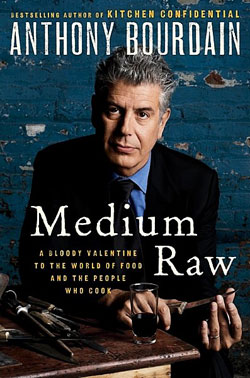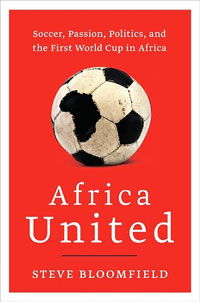Read This: Medium Raw
 I’m a big fan of Anthony Bourdain’s No Reservations, the Travel Channel series where he hops from one nation to the next, checking out local restaurants and regional cuisines. The longer the show’s been on, and the more places he visits, viewers have witnessed a major shift in Bourdain’s personality—or maybe it’s just that we’re seeing a side of him that Kitchen Confidential kept on the back-burner; I guess you’d have to have had spent a lot of time with him to be able to tell… Anyway, sure, he’s always going to be the abrasive, opinionated guy who just comes right out and says what he’s thinking, but in letting us tag along on his global wanderings, he’s revealed a deeply inquisitive aspect—he comes across as genuinely caring about the cultural issues that keep coming up during his travels, and though (as he points out a few times in Medium Raw, he’s no Michael Pollan or Eric Schlosser, his show has done a lot to raise awareness about the alternatives we have when it comes to dealing with our food: not just what we eat, but where it comes from, how it’s made ready to us, and so forth.
I’m a big fan of Anthony Bourdain’s No Reservations, the Travel Channel series where he hops from one nation to the next, checking out local restaurants and regional cuisines. The longer the show’s been on, and the more places he visits, viewers have witnessed a major shift in Bourdain’s personality—or maybe it’s just that we’re seeing a side of him that Kitchen Confidential kept on the back-burner; I guess you’d have to have had spent a lot of time with him to be able to tell… Anyway, sure, he’s always going to be the abrasive, opinionated guy who just comes right out and says what he’s thinking, but in letting us tag along on his global wanderings, he’s revealed a deeply inquisitive aspect—he comes across as genuinely caring about the cultural issues that keep coming up during his travels, and though (as he points out a few times in Medium Raw, he’s no Michael Pollan or Eric Schlosser, his show has done a lot to raise awareness about the alternatives we have when it comes to dealing with our food: not just what we eat, but where it comes from, how it’s made ready to us, and so forth.
Medium Raw is a miscellany, a string of chapters held together largely on the strength of having been written by Anthony Bourdain: There’s some autobiographical confession,s there’s some reportage-based profiles of chefs Bourdain admires, there’s lists of the things he likes. And dislikes: The most passionate chapters are the ones in which he gives full vent with his frustrations about, to pick the three most prominent targets, the flat-out evilness of the American beef industry, the blissed-out hypocrisy of Alice Waters, and the douchebaggery of GQ food critic Alan Richman. (Really; the chapter is even titled “Alan Richman Is a Douchebag,” and even considering the biased perspective, it makes a strong case for its thesis.)
My gut tells me that these rants, as beautiful as they are, might not be the ideal introduction to Bourdain, that Medium Raw is ultimately for the fans who’ve been with him at least since Kitchen Confidential, and maybe even the earlier novels—which, I was delighted to hear when the deal that led to this book being published was announced, he’s going to start writing again. But if you haven’t read any of his earlier work, don’t let my fears stop you from trying Medium Raw. Heck, with a new season of No Reservations having just started last night, you could probably actually bring yourself up to speed pretty quickly…
6 July 2010 | read this |
Read This: Africa United
 If you’ve been following me on Twitter for the last two weeks, you know that I’m a huge fan of the Ghana Black Stars, and that I was rooting hard for them to defeat Uruguay this afternoon and advance to the World Cup semifinals. (Dominic Adiyiah was robbed, and that’s all I’m going to say about that, except that I’m cheering for the Netherlands next week.) I watched the game at Papaye, a Ghanaian restaurant in the Bronx, and during the subway ride up and back, I finally had an opportunity to finish reading Africa United, a book about thirteen of Africa’s national soccer teams (but not, unfortunately, the Black Stars) and how their fates are intertwined with the various political situations.
If you’ve been following me on Twitter for the last two weeks, you know that I’m a huge fan of the Ghana Black Stars, and that I was rooting hard for them to defeat Uruguay this afternoon and advance to the World Cup semifinals. (Dominic Adiyiah was robbed, and that’s all I’m going to say about that, except that I’m cheering for the Netherlands next week.) I watched the game at Papaye, a Ghanaian restaurant in the Bronx, and during the subway ride up and back, I finally had an opportunity to finish reading Africa United, a book about thirteen of Africa’s national soccer teams (but not, unfortunately, the Black Stars) and how their fates are intertwined with the various political situations.
Steve Bloomfield watches a lot of African soccer, but he also spends a lot of time talking to the local league officials, or recounting how regimes would use a team’s rising fortunes for their own propagandistic ends. (That cuts both ways, though; one of my favorite anecdotes is of a Zimbabwean protest speech that went: “Today Robert Mugabe we are showing you the red card! Get off the field Robert Mugabe!”) When you hear about something like the Ivory Coast’s football success helping to resolve tensions between the country’s warring northern and southern regions, it’s hard not to be moved. But for all its optimistic moments, I wouldn’t call this a feel-good book—Bloomfield is forthright about the politics, and about the problems that African footballers face in competing at a global level, and he’s certainly not saying that football is going to make Africa a democratic utopia. Analysis isn’t really the point, though. What matters here, what will stick with you, is the ground-level perspective on a part of the world that’s undergoing massive upheavals—political, economic, cultural—because it’s that perspective, that intimate glimpse into the lives that are being changed, that helps us understand this much better why Africa matters.
2 July 2010 | read this |

 Our Endless and Proper Work is my new book with Belt Publishing about starting (and sticking to) a productive writing practice.
Our Endless and Proper Work is my new book with Belt Publishing about starting (and sticking to) a productive writing practice. 
